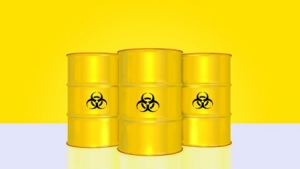Bulgaria started construction of a national repository for low- and intermediate-level radioactive waste yesterday, marking the occasion with a ceremony. The repository is being built at the Radiana site, close to the Kozloduy nuclear power plant.
Bulgarian energy minister Temenuzhka Petkova and executive director of the State Enterprise Radioactive Waste (SERAW) Dilyan Petrov broke ground for the new facility. SERAW is responsible for the decommissioning of reactors 1-4 at the Kozloduy nuclear power plant and the national radioactive waste disposal facility.
The repository will be a near-surface trench-type facility featuring multi-barrier protection for the storage of low- and intermediate-level waste (LLW/ILW) in reinforced concrete packages. It will be used to store such waste from industry, medicine and households, wastes generated from the decommissioning of Kozloduy units 1-4 and from the future operation of nuclear power plants. The repository, which will not be used for storing high-level waste or used nuclear fuel, will have a capacity of 138,200 cubic meters of waste. It is expected to be commissioned in 2021 and operate for about 60 years. The facility will then be closed and closely monitored for another 300 years.
The first stage of construction is being funded with a €71.8 million ($85.7 million) grant from the Kozloduy International Decommissioning Support Fund, which is administered by the European Bank for Reconstruction and Development.
SERAW signed a contract for the facility's construction in July 2016 with a consortium consisting of Germany's Nukem Technologies, which is owned by Russia's AtomStroyExport, and four Bulgarian companies.
The construction of the repository is part of the commitments made by Bulgaria in its accession to join the European Union. During EU accession negotiations, Bulgaria also committed to closing Kozloduy 1 and 2 by the end of 2002 and units 3 and 4 by the end of 2006. All four units are V-230 model VVER-440 reactors, which the European Commission had earlier classified as non-upgradable. Bulgaria joined the EU on 1 January 2007.
Petkova said, "The construction of the repository is a sine qua non for the development of nuclear energy in Bulgaria. The construction of the facility is also enshrined in the present program of the Bulgarian government for the period 2017-2021."






